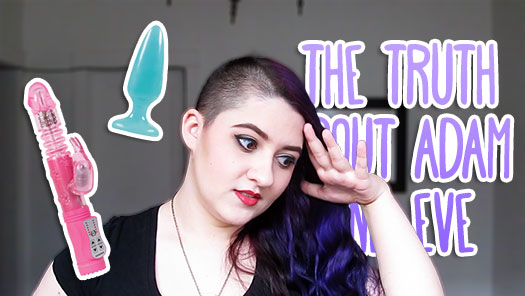The sex toy industry is completely unregulated. But would the FDA stepping in do more harm than good?
References:
- The FDA’s Crusade Against Lube – VICE
- Lube Maker, PETA At Odds With FDA Over Animal Testing – Forbes
- Breakthrough! Good Clean Love Spares Animals Tests, Sets Precedent at FDA – PETA
- Tattoo Regulations and What You Need to Know – Coalition for Tattoo Safety, May 2019
- Are Toxic Sex Toys Still a Problem? – Dangerous Lilly
- It’s Surprisingly Hard to Ban Toxic Sex Toys, But Here’s How to Protect Yourself – Glamour
Lube Safety Studies:
Sex Toy Safety Info:
- Sex Toy Material Guide – The Ins and Outs
- The Definite Guide to Toxic Sex Toy Awareness – Dangerous Lilly
- Your Genitals Deserve Better: The Case Against Toxic Toys – Hey Epiphora
- How to Tell If Your Sex Toy Is Toxic – VICE

So sex toy safety is an issue that is very near and dear to my heart. I have been educating on this topic for almost five years now, and it’s something I read and talk about almost every single day. Just because something is available for purchase does not mean it’s necessarily safe to use, and a large number of sex toys on the market are made from materials that are straight-up toxic and/or porous enough to harbor bacteria, viruses, and mold.
When asked how companies can get away with making products intended to go inside the human body out of unsafe materials, one of the standard responses from educators and activists is that the sex toy industry is unregulated. And that is completely true and important for consumers to know.
However, just leaving the explanation at that implies that regulating sex toys will necessarily solve these problems. And this is a notion that I want to push back against a little bit.
In a perfect world, that would be true. The government could ban all unsafe materials and additives and approve the non-toxic, effectively non-porous ones. Unfortunately, I just don’t think that’s realistic, and calls for regulation could have serious unintended negative consequences.
Now, I want to make it clear in this video that I am only talking about the Food & Drug Administration in the United States. I do not know what the government regulatory bodies of all other countries are like, and there could be places where sex toy regulation would have positive results for both consumers and the industry overall. But I do not trust that to be the case with the FDA.
Because in the situations where the FDA has dipped its toes into the sexuality realm, the outcomes have often not been positive. Take lube, for example. Unlike sex toys, lubricants are categorized as Class II Medical Devices, meaning they are under the jurisdiction of the FDA in the United States.
So has the FDA given clearance to safe lubes and weeded out the ones with questionable ingredients? No. In fact, in a lot of cases it has done the exact opposite. Many of the FDA-approved lubes on the market from major manufacturers like K-Y and Astroglide contain ingredients that are known to cause irritation and cell damage to vaginas and rectums, which can actually increase susceptibility to STIs and other infections.
(Check out these images of the effects of different brands of water-based lube on vaginal tissue models. I’ll link the study they’re from, as well as other relevant articles and references for this video, down in the description.)
And then on the flip side, the smaller lube companies using better ingredients and doing some of the most vital work around consumer education have to jump to through tons of hoops to try and get FDA clearance. That process can take years and cost hundreds of thousands of dollars, and some lube companies outside of the US have been completely barred from selling their products in the country while their clearance in pending.
VICE did an article on the FDA’s Crusade Against Lube back in 2015 talking about these issues. And one of the main focuses of the piece was on the fantastic British lube brand YES. They are a super cool organic lube company with a focus on intimate health who sell things like twin packs of conception-friendly lubes with two different pHs — one that’s better for sperm motility and one that’s better for vaginal health — to use at different points in the ovulation cycle. That’s awesome, and we should have that. But as of 2019, you still cannot get YES brand lubricants in the United States.
Another fun thing about the FDA clearance process for lubes and other medical devices is that it requires animal testing. Now, companies can theoretically get around this if they’re able to prove that they don’t need it by providing a suitable alternative. But that, of course, takes even more time, money, and effort, which is a huge strain on smaller companies.
And until 2017, the FDA didn’t even accept tests on actual humans as a suitable alternative for lubricants, meaning any lube that received FDA 510(k) certification before that point was almost certainly tested on animals. Good Clean Love, the company that was finally successful in getting the FDA to make that change after fighting for it for years, was still forced to pay at least $50,000 on animal testing to get their previous lubes cleared back in 2015, something they were and are deeply upset about.
Now let’s shift gears and talk about tattooing for a minute, another industry that is very important to my life and interests.
Baby’s first tattoo pic.twitter.com/nE9MPL8dBP
— Erika Lynae (@Erika_Lynae) June 22, 2018
On its face, FDA regulation of tattoo inks sounds like something obvious and necessary. It’s another product that goes inside the human body, and if it contains unsafe ingredients, that could have serious negative medical consequences.
However, right now, as I’m recording this video, there is legislation in both the Senate and the House of Representatives that, if passed, would be absolutely disastrous for the legal tattoo industry. This legislation would alter and toughen the regulatory process for cosmetics, the category that the FDA considers tattoo inks to fall under.
The problem is that these cosmetic regulations were not written with tattoo inks in mind. The short timeline they give to provide proof of ingredient safety is entirely unfeasible for a type of product that exists in the skin permanently and thus needs to be tested for longer term effects. The technology we have is nowhere near where it needs to be for existing brands to realistically meet that timeline. Furthermore, ingredient restrictions for general cosmetics would seemingly require reformulating the inks to a point that would affect the permanency of tattoos.
So what happens if the tattoo ink companies doing their best to provide the safest, highest quality products possible aren’t able to meet these new standards? Artists and clients are going to have to settle for less reputable people hocking mystery homemade concoctions and sketchy pigments from random overseas companies who don’t care to meet any safety standards. (You know, the kind of stuff that we see in unlicensed prison and home tattooing that actually does cause bad reactions.)
Government regulators rarely take the time to understand niche industries and what’s actually in their customers’ best interest.
Which brings me back to sex toys. What is the most likely outcome if the US government steps in and decides to try to regulate the sex toy industry?
Well, we’ve learned from the tattoo debacle that they’re unlikely to give sex toys their own regulatory category and will probably place them under an existing umbrella. Given the nature of the industry and the fact that a small number of products in it are already classified this way, that umbrella would most likely be Class II Medical Devices. That’s the same category as condoms, lube, and some Kegel exercisers and therapeutic vibrators.
And based on the FDA’s treatment of lube, we have a pretty good idea of how things might play out. Namely, the big companies — your Doc Johnsons, your Pipedreams — will likely continue being allowed to do whatever they want, for the most part. I could see the FDA actually banning phthalates, which would be a positive.
But we also know from recent studies by independent organizations and a few European governments that the use of phthalates in sex toys has dramatically decreased over the last 10 years. We also know that phthalates tend to act in more subtle, long-term ways, meaning that they may not even be what’s responsible for the severe chemical burns and other immediate negative effects many people experience when they use toxic toys.
And what will happen to smaller indie brands, the folks that have been leading the charge on the body-safe sex toy movement for years? Are they going to have to pay exorbitant amounts of money to get each product through the FDA clearance process to be sold in the US? Are they going to have to fight for years to get around animal testing requirements?
I strongly believe that FDA sex toy regulation would put an unreasonable strain on the parts of the industry that are currently doing everything right, and it would do little-to-nothing to actually protect consumers from porous and toxic toys.
So that’s what I have to say about that.
If you have any thoughts or questions on this topic, feel free to leave them down in the comments. I’ll be back in the next week or so with a new vibrator review, and if you haven’t seen it yet I just released the 5th edition of my annual Top 10 Sex Toys Under $30 list. So I’ll be sure to link that for you as well.
As always, thanks for watching, and I’ll see you next time!





